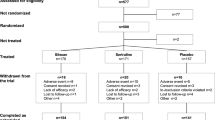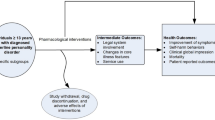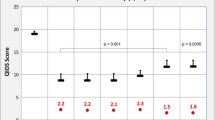Abstract
Research into the relationship between depression and personality disorder is compromised by a number of methodologic factors, including differing concepts of personality disorder, the validity of a personality disorder diagnosis, the effect of mood on diagnosis, and the overlap between some personality disorder symptoms and mood symptoms. Personality pathology is common in patients with personality disorder. Reasons for this include a “scar” effect of chronic low mood on attitudes and behaviors, as well as possible risk factors via certain personality traits. The negative effect of comorbid personality disorder on treatment outcome in depressed patients may be less than previously believed. Possible reasons include treatment bias in non-controlled trials and the increasing use of selective serotonin reuptake inhibitors rather than tricyclic antidepressants. Many personality traits and disorders may be part of the psychopathology of depression and share a common origin.
Similar content being viewed by others
References and Recommended Reading
Thase ME: The role of Axis II comorbidity in the management of patients with treatment-resistant depression. Psychiatr Clin North Am 1996, 19:287–309.
Akiskal H, Hirschfeld R, Yerevanian B: The relationship of personality to affective disorders: a critical review. Arch Gen Psychiatry 1983, 40:801–810.
American Psychiatric Association: Diagnostic and Statistical Manual of Mental Disorders, edn 4. Washington, DC: American Psychiatric Association; 1990.
Zimmerman M: Diagnosing personality disorders: a review of issues and research methods. Arch Gen Psychiatry 1994, 51:225–245.
Hunt C, Andrews G: Measuring personality disorder: the use of self-report questionnaires. J Personal Disord 1992, 6:125–133.
Tyrer P: Are personality disorders well classified in DSM-IV? In The DSM-IV Personality Disorders: Diagnosis and Treatment of Mental Disorders. Edited by Livesley WJ. New York: Guilford Press; 1995:29–42.
Livesley WJ, Jang KL, Vernon PA: Phenotypic and genetic structure of traits delineating personality disorder. Arch Gen Psychiatry 1998, 55:941–948.
Mulder RT: Personality pathology and treatment outcome in major depression: a review. Am J Psychiatry 2002, 159:359–371. This review concludes that whether personality pathology significantly worsens treatment outcome in patients with depression is very dependent on study design. The best-designed studies seem to report the least effect of personality pathology on outcome, suggesting that such pathology should not be seen as an impediment to good treatment response.
Kendler K, Neale M, Kessler R, et al.: A longitudinal twin study of personality and major depression in women. Arch Gen Psychiatry 1993, 50:853–862.
Kendler KS, Gardner CO, Prescott CA: Toward a comprehensive developmental model for major depression in women. Am J Psychiatry 2002, 159:1133–1145. The author used structures equation modeling to generate a developmental model for the etiology of depression in women. The model includes multiple risk factors throughout the life cycle, including the influence of temperament and personality.
Widiger TA, Anderson KG: Personality and depression in women. J Affect Disord 2003, 74:59–66.
Rothschild L, Zimmerman M: Personality disorders and the duration of depressive episode: a retrospective study. J Personal Disord 2002, 16:293–303.
Russell JM, Kornstein SG, Shea MT, et al.: Chronic depression and comorbid personality disorders: response to sertraline versus imipramine. J Clin Psychiatry 2003, 64:554–561.
Mulder RT, Joyce PR, Luty SE: The relationship of personality disorders to treatment outcome in depressed outpatients. J Clin Psychiatry 2003, 64:259–276. A randomized trial comparing nortriptyline and fluoxetine and showing that although comorbid personality disorder had no overall effect on treatment outcome, patients with a cluster B personality disorder who received nortriptyline did worse than those who received fluoxetine.
Sorenson SB, Rutter CM, Aneshensel CS: Depression in the community: an investigation into age of onset. J Consult Clin Psychol 1991, 59:541–546.
Fava M, Farabaugh AH, Sickinger AH, et al.: Personality disorders and depression. Psychol Med 2002, 32:1049–1057. A large carefully designed study that reported on changes in personality disorder, as well as their influence on outcome, in a fluoxetine treatment study.
Griens AMGF, Jonker K, Spinhoven P, Blom MBJ: The influence of depressive state features on trait measurement. J Affect Disord 2002, 70:95–99.
Du L, Bakish D, Ravindran AV, Hrdina PD: Does fluoxetine influence major depression by modifying five-factor personality traits? J Affect Disord 2002, 71:235–241.
Seivewright H, Tyrer P, Johnson T: Change in personality status in neurotic disorders. Lancet 2002, 359:2253–2254. A brief paper presenting a long-term prospective follow-up of a cohort of patients with a neurotic disorder. It reported very low stability of all personality disorder categories and disorders.
Farabaugh A, Mischoulon D, Yeung A, et al.: Predictors of stable personality disorder diagnoses in outpatients with remitted depression. J Nerv Ment Dis 2002, 190:248–256.
Asaad T, Okasha T, Okasha A: Sleep EEG findings in ICD-10 borderline personality disorder in Egypt. J Affect Disord 2002, 71:11–18. An interesting attempt at biologically validating differences in borderline personality disorder and mood disorders.
Mulder RT, Joyce PR: Relationship of temperament and behavior measures to the prolactin response to fenfluramine in depressed men. Psychiatry Res 2002, 109:221–228.
Ryder AG, Bagby RM: Diagnostic viability of depressive personality disorder: theoretical and conceptual issues. J Personal Disord 1999, 13:99–117.
Ryder AG, Bagby RM, Schuller DR: The overlap of depressive personality disorder and dysthymia: a categorical problem with a dimensional solution. Harv Rev Psychiatry 2002, 10:337–352. A good summary of the difficulties inherent in the concept of depressive personality disorder. The authors point out that similar difficulties are present with other personality disorders and their relationship to Axis I disorders. They propose a solution conceptualizing personality pathology in a dimensional rather than categoric manner.
Peterson T, Hughes M, Papakostas GI, et al.: Treatment resistant depression and Axis II comorbidity. Psychother Psychosom 2002, 71:269–274.
Brieger P, Ehrt U, Bloeink R, Marneros A: Consequences of comorbid personality disorders in major depression. J Nerv Ment Dis 2002, 190:304–309.
Viinämaki H, Hintikka J, Honkalampi K, et al.: Cluster C personality disorder impedes alleviation of symptoms in major depression. J Affect Disord 2002, 71:35–41.
Meyers BS, Sirey JA, Bruce M, et al.: Predictors of early recovery from major depression among persons admitted to community-based clinics: an observational study. Arch Gen Psychiatry 2002, 59:729–735.
O’Leary D, Costello F: Personality and outcome in depression: an 18-month prospective follow-up study. J Affect Disord 2001, 63:67–78.
Charney DS, Nelson JC, Quinlan DM: Personality traits and disorder in depression. Am J Psychiatry 1981, 138:1601–1604.
Black D, Bell S, Hulbert J, Nasrallah A: The importance of Axis II in patients with major depression: a controlled study. J Affect Disord 1988, 14:115–122.
Fava M, Bouffides E, Pava JA, et al.: Personality disorder comorbidity with major depression and response to fluoxetine treatment. Psychother Psychosom 1994, 62:160–167.
Hamilton M: A rating scale for depression. J Neurol Neurosurg Psychiatry 1960, 23:56–62.
Melartin TK, Rytsala HJ, Leskela US, et al.: Current comorbidity of psychiatric disorders among DSM-IV major depressive disorder patients in psychiatric care in the Vantaa Depression Study. J Clin Psychiatry 2002, 63:126–134.
Brieger P, Ehrt U, Marneros A: Frequency of comorbid personality disorders in bipolar and unipolar affective disorders. Compr Psychiatry 2003, 44:28–34.
Kool S, Dekker J, Duijsens IJ, et al.: Changes in personality pathology after pharmacotherapy and combined therapy for depressed patients. J Personal Disord 2003, 17:60–72.
Author information
Authors and Affiliations
Rights and permissions
About this article
Cite this article
Mulder, R.T. Depression and personality disorder. Curr Psychiatry Rep 6, 51–57 (2004). https://doi.org/10.1007/s11920-004-0039-3
Issue Date:
DOI: https://doi.org/10.1007/s11920-004-0039-3




